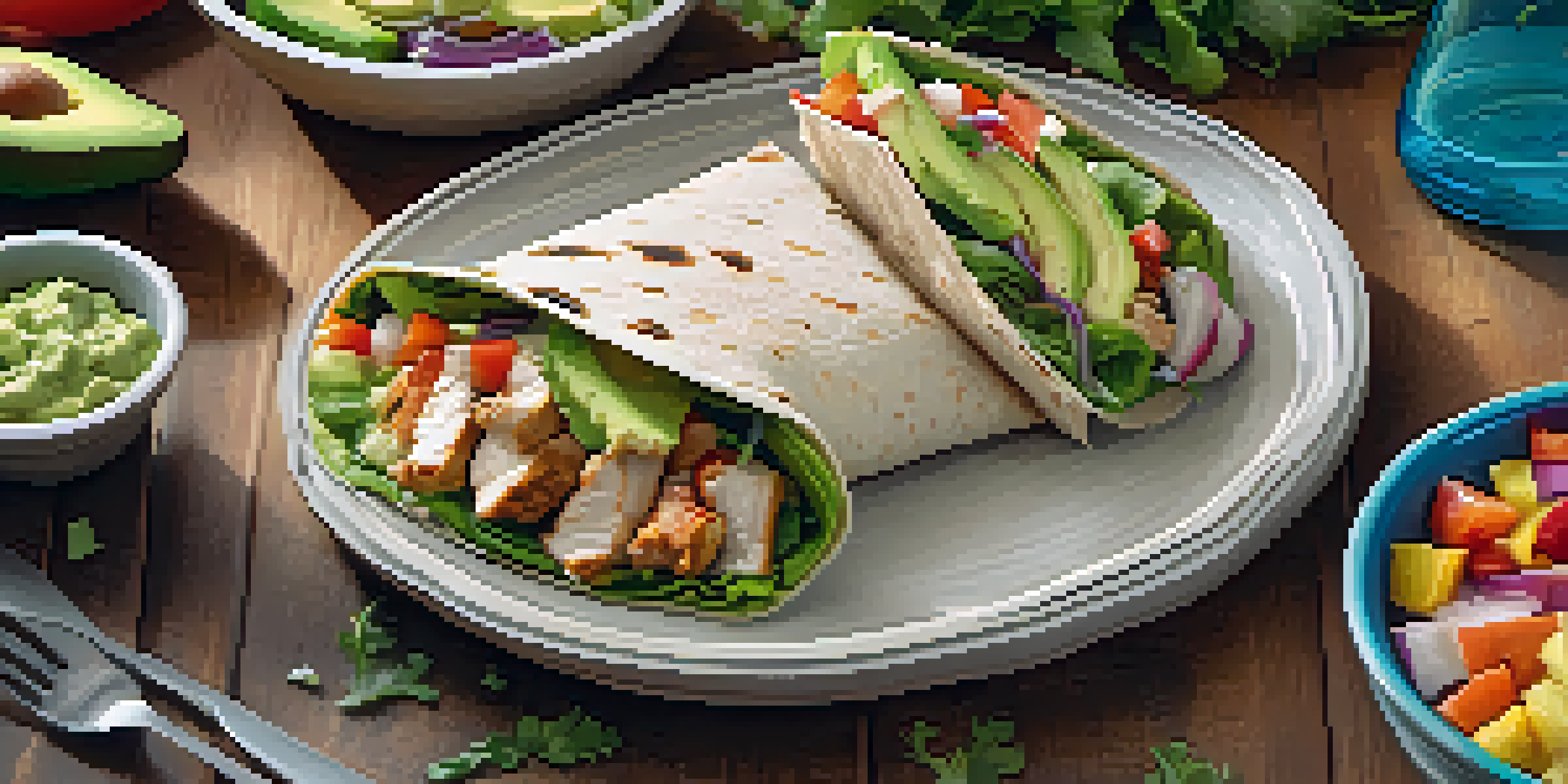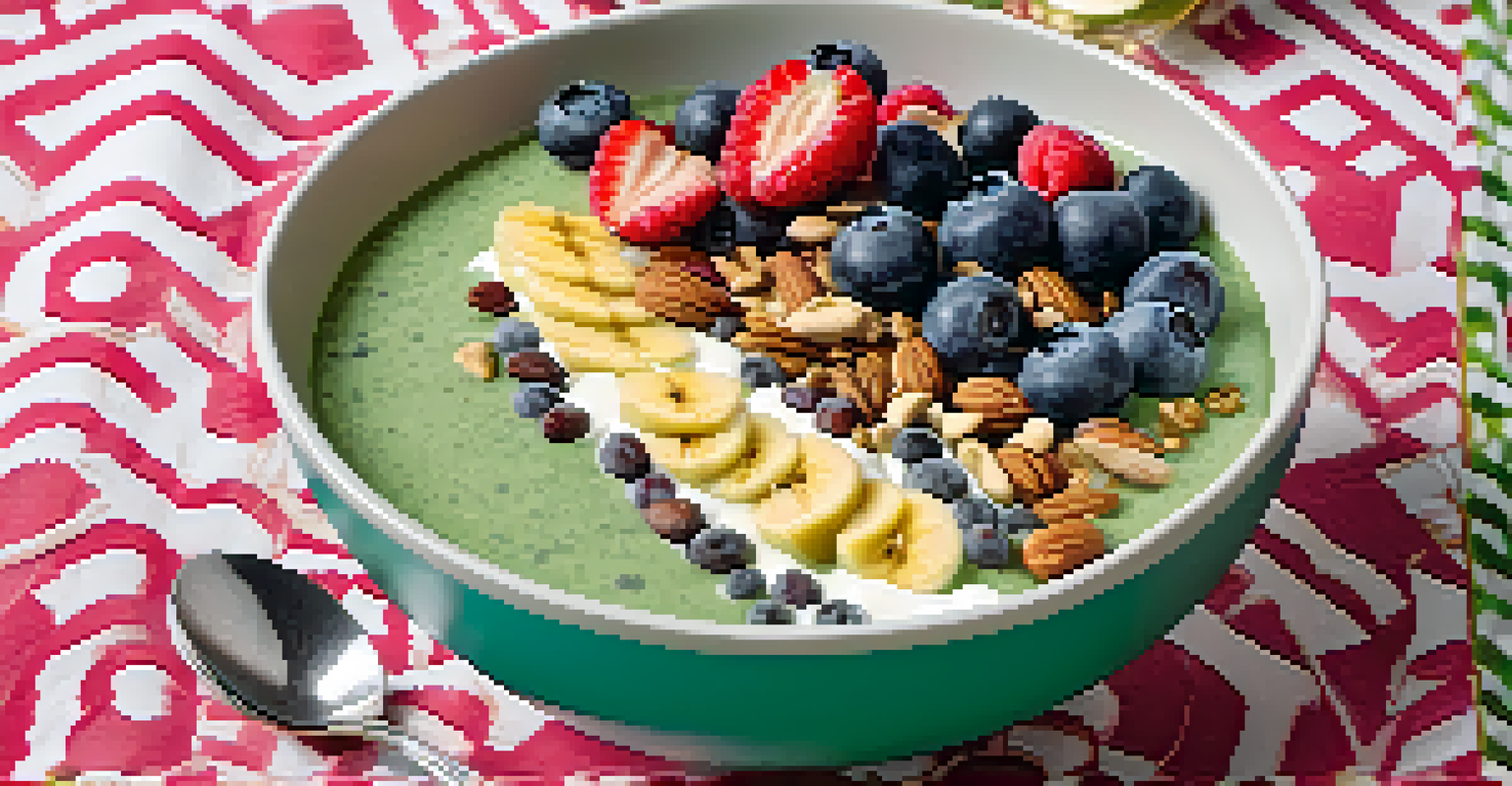Nutrition and Exercise: The Best Foods for Recovery

Understanding Recovery: Why Nutrition Matters
Recovery is a crucial phase in any fitness routine, as it helps your body repair and rebuild. Proper nutrition plays a vital role in this process, ensuring your muscles have the necessary nutrients to recover effectively. When you exercise, your body undergoes stress, which can lead to muscle soreness and fatigue if not managed well.
Nutrition is not just about eating, it's about learning to live.
The right foods can speed up recovery, reduce inflammation, and replenish energy stores. Think of your body as a car: just as a car needs the right fuel to run smoothly, your body requires the proper nutrients to function at its best. Focusing on nutrition during recovery helps you bounce back stronger and ready for your next workout.
Incorporating a balanced diet rich in proteins, carbohydrates, and healthy fats will support your recovery efforts. It’s not just about what you eat immediately after exercise, but also your overall daily intake that influences how quickly you can get back to your routine.
Protein Power: The Building Blocks of Recovery
Protein is essential for muscle repair and growth, making it a key component of recovery nutrition. When you exercise, tiny tears occur in your muscle fibers, and protein helps to mend and strengthen those fibers. This is why many athletes prioritize protein-rich foods after their workouts.

Foods like chicken, fish, eggs, and legumes are excellent choices for post-exercise meals. They provide the necessary amino acids that your body needs for recovery. A common recommendation is to aim for about 20-30 grams of protein within two hours after your workout to maximize muscle repair.
Nutrition Fuels Recovery
Proper nutrition is essential for effective recovery, providing your body with the nutrients it needs to repair and rebuild after exercise.
In addition to whole foods, protein shakes or bars can be convenient options for on-the-go recovery. Just remember to choose high-quality products that don’t contain excessive sugars or artificial ingredients.
Carbohydrates: Refueling Your Energy Stores
Carbohydrates are often misunderstood, but they are vital for recovery, especially after intense workouts. During exercise, your body uses glycogen, which is stored in your muscles and liver, as its primary energy source. Afterward, replenishing these glycogen stores is crucial for your next workout.
You are what you eat, so don't be fast, cheap, easy, or fake.
Incorporate complex carbohydrates like whole grains, fruits, and vegetables into your post-exercise meals. These foods provide a steady release of energy and essential vitamins and minerals. For example, a quinoa salad with mixed veggies and a side of fruit can make a balanced post-workout meal.
Timing is also important; aim to consume carbohydrates within 30 minutes after your workout for optimal replenishment. This helps ensure that your body can quickly restore its energy reserves and prepare for future training sessions.
Healthy Fats: Supporting Overall Recovery
While protein and carbohydrates often take the spotlight, healthy fats are equally important for recovery. Fats help to reduce inflammation and provide sustained energy, especially during longer workout sessions. Incorporating sources of healthy fats into your recovery meals can promote better overall health.
Foods like avocados, nuts, seeds, and olive oil not only taste great but also deliver essential fatty acids that support your body’s recovery processes. For instance, adding a tablespoon of nut butter to your post-workout smoothie can provide both healthy fats and a creamy texture.
Protein and Carbs Matter
Incorporating protein and carbohydrates into your post-workout meals helps maximize muscle repair and replenish energy stores.
Don’t shy away from fats; just be mindful of portion sizes. A balanced approach that includes healthy fats alongside proteins and carbohydrates will create a well-rounded recovery plan.
Hydration: The Unsung Hero of Recovery
Hydration plays a critical role in recovery, yet it’s often overlooked. After exercising, your body loses fluids through sweat, and replenishing these fluids is essential for optimal recovery. Dehydration can lead to fatigue, muscle cramps, and prolonged soreness, which can hinder your performance.
Water is the best choice for hydration, but incorporating electrolyte-rich beverages can also be beneficial, especially after intense workouts. Coconut water or sports drinks can help replenish lost electrolytes and keep you hydrated. Just be cautious of added sugars in some sports drinks.
Make it a habit to drink water before, during, and after your workouts. Keeping a water bottle handy can serve as a reminder to stay hydrated throughout the day, ensuring you’re always ready for your next fitness challenge.
Timing Your Meals: When to Eat for Recovery
Meal timing can significantly impact your recovery process. Consuming the right nutrients at the right time can enhance muscle repair and energy restoration. Post-exercise nutrition should ideally happen within a two-hour window to maximize benefits.
Plan your meals and snacks around your workout schedule. For example, if you work out in the morning, a balanced breakfast with protein, carbs, and healthy fats can kickstart your recovery. If you exercise in the evening, a nutritious dinner can help prepare your body for the night’s rest.
Hydration is Key
Staying hydrated is crucial for recovery, as it helps prevent fatigue and muscle cramps while promoting overall health.
Listening to your body is important, too. Everyone's recovery needs are different, so pay attention to how you feel and adjust your meal timing and content accordingly. Experimenting with different foods and timings can help you find the best routine for your recovery.
Sample Recovery Meals: Easy Ideas to Try
Having a few go-to recovery meals can simplify your post-workout nutrition. Consider meals that balance protein, carbs, and healthy fats for optimal recovery. For example, a grilled chicken wrap with whole wheat tortilla, mixed greens, and avocado provides a satisfying and nutritious option.
Another great option is a smoothie made with Greek yogurt, spinach, banana, and almond milk. This quick and easy meal is packed with protein, vitamins, and minerals, making it perfect for post-workout recovery.

Don’t forget about leftovers; they can be a lifesaver! Preparing a large batch of quinoa and roasted vegetables can yield multiple meals, ensuring you always have something ready to nourish your body after exercise.